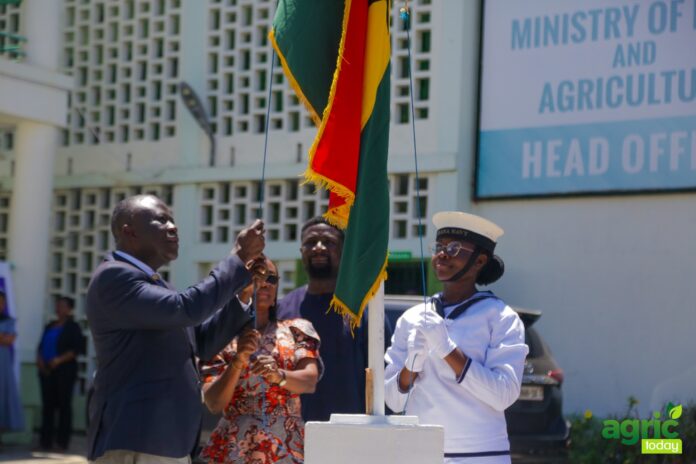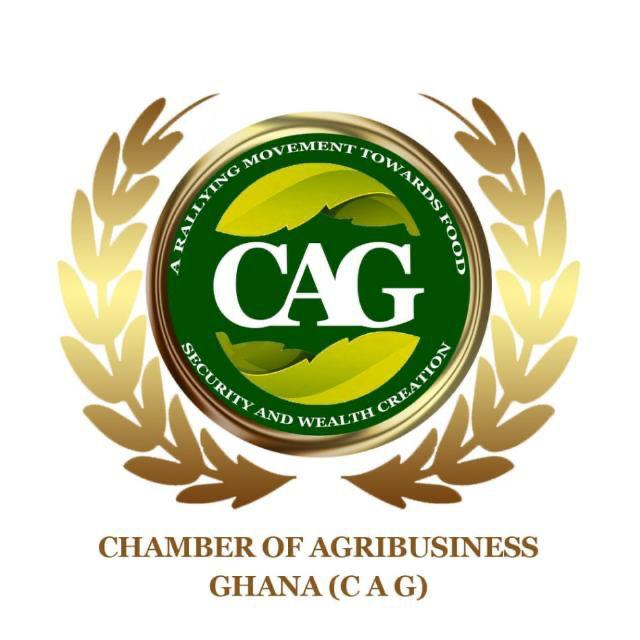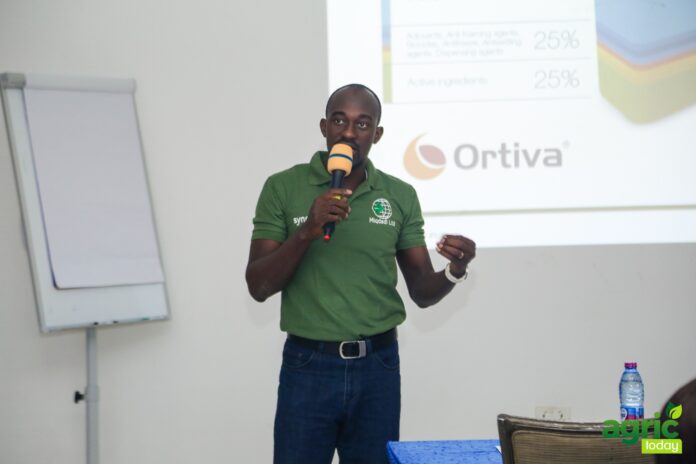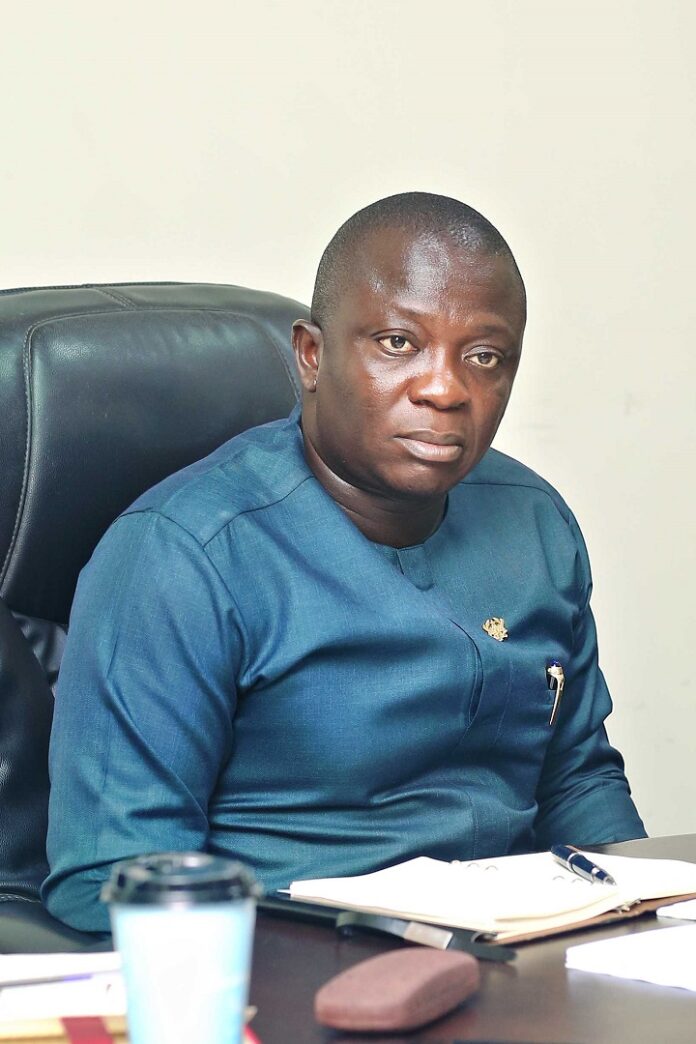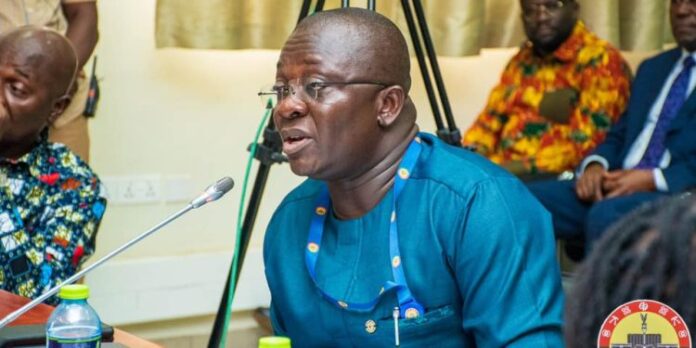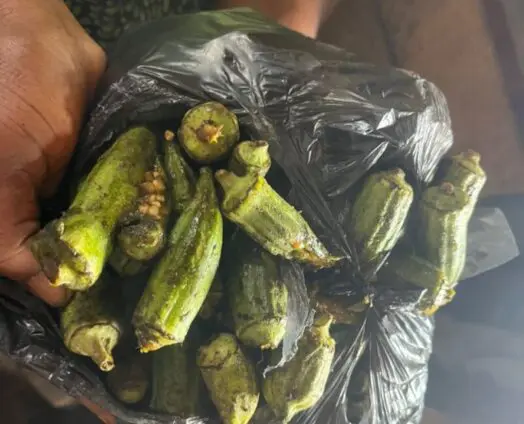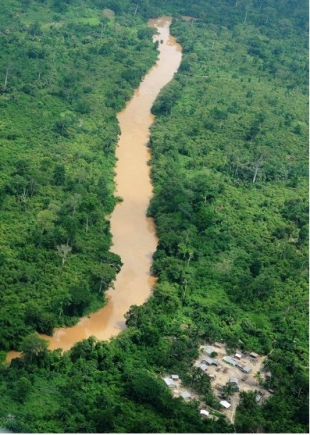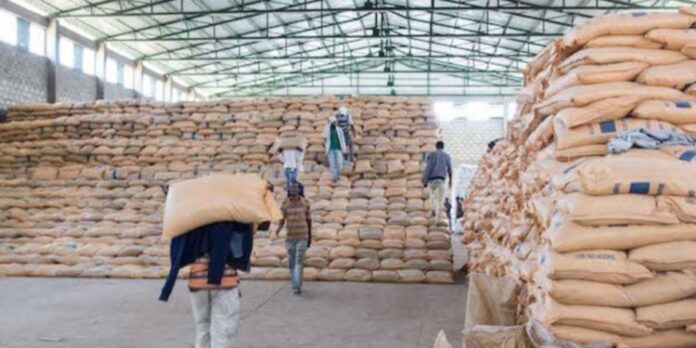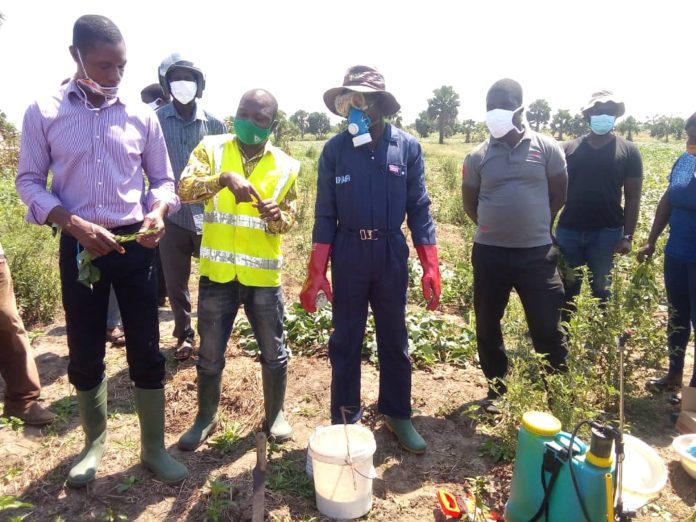Right to Food for Better Life and Better Future is critical to attaining SDGs of the United Nations. However, due to the climate crisis efforts to combat hunger are currently off track, leading to significant food inflation worldwide.
To address this challenge across the globe during World Food Day, the Deputy Minister of Food and Agriculture, (Crop), Yaw Frimpong Addo delivering the speech on behalf of the Minister of Agriculture expressed the ministry’s unwavering commitment to fighting hunger and malnutrition.
He emphasized the need for improved food and nutrition for all citizens. His remarks highlighted the alarming statistic that nearly 29% of the global population experiences food insecurity.
According to the World Bank, efforts to combat hunger are currently off track, leading to significant food inflation worldwide.
He pointed to regional disparities in food security in Ghana, linking the challenges to climate change and the heavy reliance of farmers on rainfall. He noted that only 1% of the farming population has access to irrigation systems, while the majority depend solely on rainwater for agricultural activities.
This dependency makes food production vulnerable to climate variability, exacerbating food insecurity.
The Deputy Minister detailed various government interventions aimed at mitigating food insecurity in Ghana. He highlighted the “Planting for Food and Jobs” Phase Two initiative, designed to boost local food production and alleviate hunger.
Additionally, he mentioned the “Ghana Cares Obaatanpa” program, among other initiatives, that will contribute to addressing food security challenges in the country.
Emphasizing the government’s dedication, the deputy minister affirmed the commitment to realizing the theme of this year’s celebration: “Right to Food for Better Life and Better Future.”
The Ministry of Fisheries and Aquaculture Development also reiterated its commitment to the theme of this year’s World Food Day celebration.
They highlighted that the focus on the “Right to Food for a Better Life” aligns with their developmental agenda aimed at eradicating poverty, hunger, and malnutrition. The ministry acknowledged the significant role that fish plays in the diet of many Ghanaians, particularly given health concerns related to meat consumption.
Furthermore, the ministry introduced the National Aquaculture Plan, which is a blueprint for enhancing food availability, especially in fish production. This initiative aims to improve food security and provide Ghanaians with access to nutritious sources of protein.
Ms. Aurore Rusiga, the Country Director of the World Food Programme, also underscored the importance of ensuring that no one is left behind in the fight against hunger.
She emphasized the necessity of providing safe and nutritious food for all. Rusiga urged Ghanaians to engage in food production that meets international standards, particularly those recognized by the United Nations market.
“The right to food is not merely about having something to eat; it encompasses ensuring that everyone has access to nutritious food,” she asserted.
Rusiga emphasized that the WFP in Ghana is dedicated to improving access to food and supporting smallholder farmers in their efforts to produce food sustainably.
The FAO also highlighted its crucial role in promoting food security. FAO Country Representative Ms. Priya Gujadhur shared a statistic, indicating that over 730 million people around the world lack access to adequate food.
She explained that the FAO is actively working to enhance the livelihoods of more than 12,000 smallholder farmers across six districts in Ghana. The organization firmly believes that food is not just a necessity; it is a fundamental human right.
World Food Day, observed every October 16, serves as a vital reminder of the global fight against hunger and malnutrition. Established by the FAO, this day focuses on promoting sustainable agriculture and equitable access to food for all. The theme for 2024, “Right to Food for a Better Life,” advocates for recognizing food as a fundamental human right.
This significant event brought together various dignitaries and stakeholders committed to addressing food security issues. Among the notable attendees were the Deputy Minister of Food and Agriculture (Crops), Yaw Frimpong Addo; representatives from the Ministry of Fisheries and Aquaculture Development; delegates from the World Food Programme (WFP); and officials from the Food and Agriculture Organization (FAO), among others.
World Food Day: Right to Food for Better Life and Better Future declines due to climate crisis.
Chamber of Agribusiness Ghana advocates for Sustainable Solutions to Address Food Insecurity
The Chamber of Agribusiness Ghana has urged the government to outline sustainable solutions to address food insecurity in the country.
The Chamber stated this in a press release dated October 10, 2024, signed by the Chief Executive Officer, Anthony Kofituo Morrison.
Farmer Morrison acknowledged the government’s efforts to provide relief to farmers affected by the recent dry spell.
He indicated that the announcement made by the Minister of Food and Agriculture, Hon. Bryan Acheampong (PhD), regarding the distribution of food grants to over 800,000 farmers affected by the dry spell in the northern and middle belts of the country would be a good solution, in their estimation, if a more sustainable and long-term approach were proposed to address the root causes of food insecurity when such situations arise.
The Chamber of Agribusiness outlined steps that the government should follow to ensure food security and curb food insecurity in the country.
The Chamber indicated that the government should provide funds to expand existing dams. “This action will enable farmers to engage in dry-season farming, reducing reliance on seasonal rainfall for cropping. This will not only ensure food availability throughout the year but also improve farmers’ livelihoods through enhanced but sustainable incomes,”.
“In addition to this, the government should procure and supply irrigation pumps, drip lines, water pipes, sprinklers, and other relevant accessories to affected areas for use. This will enhance food production during dry seasons and promote self-sufficiency in productivity,” Morrison added.
Farmer Morrison further highlighted that engaging banks, financial institutions, and agro-input importers to reduce interest rates and debt repayment modes for affected farmers will alleviate the financial burdens stemming from loans and facilities they have contracted for their business activities.
He stated, “It is believed that the funds from these reduced burdens can enable farmers to reinvest in their farms to make up for the shortfall this situation has caused. The end outcome of this action will lead to increased productivity and food security throughout the country.”
“Again, we urge the government to establish a National Agriculture Social Protection Mechanism. The government can do this by developing a 10-year policy brief that spells out a well-documented and coherent Agriculture Social Protection Intervention Mechanism with a deliberate integration and development of a comprehensive program to drive socio-economic protection for farmers in Ghana.
The Chamber strongly believes that by integrating these components and implementing the proposed strategy, Ghana can establish a robust Agriculture Social Protection Intervention Mechanism to protect and empower its farmers to face the future with well-thought-out solutions when situations like this arise,” Morrison stated.
Another key step the government can take is to address the root causes of food insecurity in the country, especially those causes linked to climate change.
It is their view that climate change has exacerbated food insecurity in Ghana, particularly in the northern regions.
Research has shown that adopting climate-resilient agricultural practices, such as dry-season farming and mulching, can improve household nutrition and food security.
The Chamber urges the Ministry to adopt a comprehensive approach that addresses the underlying causes of food insecurity, some of which include galamsey, the non-availability of drought-resistant seeds, and poor funding of farmers, rather than providing temporary relief.
The Chamber again urges the government to establish a National Agriculture Risk Management Agency. This agency would serve as a proactive measure to prevent and mitigate risks, ensuring the sector’s resilience, stability, and sustainability in both good and bad seasons.
Additionally, an Agriculture Emergency Preparedness Strategy should be commissioned for Ghana. These two systems and structures are crucial for the country’s agricultural sector development. By establishing these forward-looking agencies and strategies (National Agriculture Risk Management Agency and Agriculture Emergency Preparedness Strategy), Ghana can ensure a resilient and sustainable agricultural sector, better equipped to manage risks and respond to emergencies.
“We wish to reiterate that research shows that the adoption of improved agricultural technologies can increase productivity and income for farmers.”
However, they posed questions to the government for clarity:
What level of technical planning went into and led to this decision by the government?How does this distribution align with the overall food security and agricultural development strategy for Ghana?
What criteria were used to identify the 800,000 farmers, and how will the grants be distributed fairly and efficiently?
How will this short-term solution address the long-term effects of climate change and agricultural productivity in Ghana?
Is the distribution of food grants within the Ministry’s role and mandate, or should other agencies be involved?
The Chamber of Agribusiness Ghana further calls on the Ministry of Food and Agriculture to reconsider its approach and adopt sustainable solutions that promote food security, productivity, and resilience.
It is the Chamber’s hope that, as a key stakeholder, their suggestions and recommendations will be integrated into the solutions being offered by the Ministry of Food and Agriculture (MOFA).
Syngenta unveils Ortiva and Eforia to protect crops for high and quality production.
It is undeniable facts that high-quality crop production is hindered due to the attack of fungi and insects; this affects food security contributing to the high cost of food in Ghana.
To alleviate this and protect crops from fungi and insects for high-quality crop protection, Syngenta a global CP manufacturer in collaboration with, Miqdadi Limited have launched two crop protection products, Ortiva 250SC and Eforia 045ZC onto the Ghana market.
Ortiva is a broad-spectrum contact and systemic fungicide designed to combat various diseases, including botrytis, rust, anthracnose, ring spot, ascochyta and downy mildew in vegetables, field crops and fruit trees. It can also be used for post-harvest treatment some fruit crops.
Eforia 045ZC, on the other hand, is an insecticide known for its fast action and high efficiency against a wide range of adult insects and their larvae. It offers a fast acting with unique trans-systemic and knockdown effect providing growers a versatile pest solution for all crop type.
These two products were launched simultaneously by Syngenta in collaboration with Miqdadi on Friday, October 11, 2024, at the Tomreik Hotel in East Lagon.
During the launch, Kinsley Adade, the country manager of Syngenta, provided detailed insights into Ortiva. He described it as a powerful solution for protecting crops against numerous diseases.
Ortiva contains the active ingredient Azoxystrobin, which is registered in over ninety-two countries and is suitable for more than 120 different crops.
Adade emphasized that Ortiva ensures excellent disease control and boasts unique systematic properties that enhance its effectiveness.
He further elaborated on the benefits that Syngenta offers with Ortiva, stating that the product not only improves water stress tolerance and root development but also enhances disease control, photosynthesis, and nitrogen utilization in the soil.
Adade highlighted that Ortiva significantly contributes to extending the shelf life of crops, keeping the leaves green for longer periods, and providing efficient photosynthetic value.
According to Mr. Adade Ortiva leads to higher yields and better-quality produce.
Speaking to Agric Today at the launch, Mr. Adade explained that the optimal use of Ortiva involves applying it preventively or curatively, advising that it is more effective to address disease early on to mitigate the risk of yield or quality loss. He recommended applying Ortiva at the early stages of a disease attack for the best results.
Mr. Adade also discussed the composition of Ortiva, which consists of fifty percent water, twenty-five percent active ingredients, and twenty-five percent composed of antifoaming agents, biocides, adjuvants, antifreeze agents, and dispensing agents. This well-balanced formulation is designed to maximize the product’s efficacy and safety.
Mr. Adade emphasized Syngenta’s commitment to providing top notch products tailored to support growers through the partners such as Miqdadi. He urged farmers to patronize crop protection solutions from Syngenta which would assure them of good yields which would be of high quality suited for the global market.
During the presentation of Eforia 045ZC, Jose Delmare Kouassi, the customer marketing manager for Syngenta West and Central Africa, explained that this product is specifically designed for pest control in vegetables and other field crops
He highlighted that Eforia is rapidly absorbed by leaves once sprayed, providing a lasting effect while providing effective pest control. The product is effective against various chewing and sucking pests, including aphids, fruit flies, and Lepidoptera, among many others.
Kouassi also shared important information regarding the application of Eforia. He indicated that it should be applied 20 to 30 days after sowing.
He stressed the importance of following the label instructions carefully for optimal results. He emphasized safety and insisted that users wear personal protective equipment (PPE) during application.
‘Apart from maize, food prices have remained stable’ – Agric Minister on dry spell planning
Food and Agriculture Minister, Bryan Acheampong, opened up about the government’s meticulous planning to cushion the agricultural sector from the impacts of the dry spell experienced this year.
The dry spell, which many feared would trigger a food crisis, was anticipated and accounted for well before it struck.
“We knew about the dry spell and had projected its impact as far back as February,” Bryan Acheampong revealed, underscoring the Ministry’s proactive stance in mitigating the effects of the adverse weather conditions.
“We’ve been working to ensure that if it did happen, we would not feel that much of an effect on our food systems,” he said in a recent interview on Joy News’ PM Express Business Edition.
The Minister explained that the Ministry implemented a strategic action plan to support Ghanaian farmers and safeguard the country’s food security.
He credited this early planning for the stability in food prices, particularly in a year when a significant drought could have had devastating consequences.
“It is not something that just dropped out of the sky; it’s something that we planned for, and we are beginning to see the fruits of it,” he said.
October is usually a critical month for the arrival of grains from the northern regions on the market.
Bryan Acheampong acknowledged that while maize prices had risen due to lower production during the dry spell, other staple food prices had remained stable or even decreased, thanks to the Ministry’s efforts.
“By now, the northern grains should have been on the market. It is not so, but the price of food should have been way through the roof.
“Yet, there’s a lot of food on the market,” he remarked, citing stable prices for staples such as plantain, tomatoes, and cassava.
The Minister further stated that while the maize market faced challenges, the overall food supply remained resilient due to the Ministry’s interventions.
“Except for maize, every other staple that we consume, the price is either coming down or has been relatively stable,” Bryan Acheampong noted.
He also mentioned that the Ministry is working hard to contain the maize price increase by ensuring that enough supplies enter the market.
‘I don’t know where they got their data from’ – Agric Minister questions Statistical Service food price report
Food and Agriculture Minister Bryan Acheampong has expressed scepticism about recent data released by the Ghana Statistical Service (GSS) on food prices and inflation, questioning the sources of their information.
Speaking on PM Express Business Edition on Joy News, he said his Ministry’s own tracking of food prices paints a different picture than what has been reported.
“I don’t know where Statistical Service collected their data from,” the Minister stated bluntly.
“I am in every part of this country daily. I get data on farm gate prices of almost 22 commodities that we are tracking. I get market prices of these items daily.”
Bryan Acheampong highlighted the fact that while maize prices have indeed risen due to the dry spell, prices for other essential food items such as plantain, tomatoes, onions, and cassava have dropped significantly.
“Plantain has dropped by 27%, tomatoes by 30%, onions by 11%, and cassava by 13%,” he said, dismissing the idea that food prices are spiralling out of control.
He added, “This is what is happening on the ground… If you go to the market, the prices of everything, except maize, are coming down.”
The Minister also pointed out the misunderstanding in how inflation figures are presented.
According to him, the Ghana Statistical Service’s method of comparing September 2024 prices to those of September 2023 doesn’t reflect the more recent downward trend in food prices.
“Inflation figures for September are comparing prices from September this year to last year September. But I am telling you, from January to date, the price of food is going down,” Bryan Acheampong clarified.
He elaborated further by noting that despite the dry spell, food prices had largely stabilised, especially during September.
“Notwithstanding the announcement of the dry spell, we’ve seen a significant decrease in the prices of food on the market. The foods that we eat—tomatoes, onions, peppers, cassava, plantain, soya, sorghum, millet—except for maize, everything is going down.”
Bryan Acheampong concluded by reaffirming his commitment to keeping his finger on the pulse of Ghana’s food systems and ensuring accurate data is provided.
He suggested that the Statistical Service’s methods may not capture the day-to-day realities of the markets as closely as his Ministry’s data.
Pesticides contributing to early deterioration of perishable food items – Scientists
Many perishable food items on the market have been observed to be deteriorating at a faster rate than usual in recent times.
The alarming revelation has been attributed to the abuse and misuse of inorganic fertilizer applications.
The situation is heavily impacting the marketing of such produce as traders bemoan post-harvest losses, particularly of vegetables such as okra and pepper.
At the Ayigya market in Kumasi, traders are noticing the declining quality of vegetables they purchase from various farming communities.
Felicity Osei, a trader at the market, indicated that her baskets of pepper lasted longer and only shrunk in size before rotting, but now they deteriorate within just three days.
She notes the vegetable barely changes colour or dry out as they did previously before perishing.
“In the past, you could see a color change before they spoiled. Nowadays, tomatoes are visibly coated with a lot of pesticides. The vegetables do not change in color before they rot, but earlier the vegetables would change in color before rotting. The visibility of weedicide on tomatoes is much,” she stated.
The traders fingered the excessive application of fertilizer on farms as the possible cause of the disturbing trend.
Causes of early deterioration
Scientists at the Crops Research Institute of the Council for Scientific and Industrial Research (CSIR-CRI) confirmed the situation, asserting that the pesticides are not the only contributing factor.
Weed Scientist, Dr. Stephen Arthur, explains the application of pesticides distort the biochemical structure of the crops, weakening their natural ability to withstand certain weather conditions or external factors.
“Any part of the plant where the herbicide touches their deterioration is. It destroys the cells and causes necrosis and general distraction of the plant,” he said.
He noted some herbicides like the paraquat, otherwise called Gramazone, are known to deteriorate the crop’s shelf life.
Dr. Arthur stated that the farmers do not go by the recommended dosage and time use.
“I observed farmers using paraquat on fruits today and harvesting them the following day for the market. In this situation, the fruit is still alive, so once it is picked, it begins to deteriorate,” he said.
Pathogens have also been identified to contribute to the early spoilage of the vegetables.
Plant pathologist, Dr. Akwasi Aidoo, observed pathogens aid the destruction of the crops after pesticide destroys the plant tissues, leading to premature aging and destruction of the plant’s defense mechanism.
“This makes the plant more vulnerable to pathogens and disrupts the regulation of plant hormones, ultimately affecting respiration since the fruit is still alive,” he said.
Climate change is also not an overruled contributory factor as the warming climate and humid conditions are reported to aid in rapid deterioration.
The warning
Dr. Arthur is warning farmers against the use of the herbicide, paraquat, on any plant during fruit setting and/or flowering as they are said to have a carry-over effect – the transfer of unwanted materials to another organism.
He is advising farmers to observe the pre-harvest interval to avoid the deterioration and harmful exposure of the crops to chemicals.
“The whitish substance observed on fruits results from farmers not applying paraquat in a timely manner. In our interactions with some farmers, they said the market women are the ones asking to see the whitish substance on their vegetables; otherwise, they won’t buy them at a reasonable price, which leads to losses for the farmers,” he said.
The condition not only affects the freshness and appeal of the produce, but also begs the question about food safety and the health implications for consumers.
How to store the crops
There are however ways both farmers and vegetable vendors can adopt to prevent their crops from deteriorating at a faster pace.
Farmers are advised to harvest at dawn and dusk when temperatures are lower as the higher degrees of heat can cause plant stress.
Abigail Amoa-Owusu, a Post Harvest Technologist, highlighted the essence of storing the harvested crops in a cool environment.
“Right after harvesting, the produce must be stored in a farmhouse or a very cool place to prevent heat from building up on the produce. Farmers should sort the produce by separating the leaves from the mother plant and distinguishing the ripe ones from the unripe ones.
“After separating, you should use a good packaging material like a plastic crate and place it in a truck, either a cool van or a truck with a white trampoline to reflect the heat from the produce,” she said.
However, for rapidly perishable vegetables like pepper and okra, storing them at around 8 to 10°C is optimum.
Onions, on the other hand, must be dried under the sun for 12 to 24 hours after being uprooted from the ground under the process known as field curing.
Ms. Amoa-Owusu explains the process prevents disease infestations, wounds, and maintains the colour of the onion ensuring it lasts for more than 6 months.
As an individual, storing these food items is crucial for healthy living.
The scientists advised washing of the vegetables in white vinegar and water to minimize pesticide residue.
“For pepper and tomato, they are high in ethylene, so you should not put them in one packaging material because it causes fast deterioration.
Amidst these prevailing challenges, the traders want stricter surveillance by the Food and Drugs Authority in ensuring the farmers adhere to the proper use of the fertilizers and other good farming practices.
“The food and drug authorities should do more research about the chemicals being used because humans’ beings are very wicked and would purchase the wrong products and sell them for a higher price,” said Mary Ahenkrah, a trader.
Govt to revoke mining in forest reserves, Soldiers to burn galamsey equipment
The government has agreed to revoke the Environmental Protection (Mining in Forest Reserves) Regulations, 2023 (L. I. 2462) as part of a new move in the fight against illegal mining commonly known as galamsey [gather and sell].
President Nana Addo Dankwa Akufo-Addo has directed that the necessary steps to revoke the L.I. should be taken when Parliament reconvenes this October.
This is following public calls for government to take a decisive move against illegal mining and the notice by Organised Labour to embark on a nationwide strike beginning Thursday, October 10.
Following the call by Organised Labour and other stakeholders on the government to take action on the menace of illegal small-scale mining in the country, President Akufo-Addo has also directed that the enforcement measures should be ramped up.
This means all those currently mining in prohibited areas are to stop, particularly those engaging in mining in water bodies and forest reserves are to stop.
The Minister of Lands and Natural Resources, Samuel Abu Jinapor has told Graphic Online that the military is being deployed to go and demobilise all machinery of illegal miners.
Demobilisation of the equipment means the military are to destroy all such machines being used for illegal mining, the minister said.
This means “Water bodies and Forest Reserves remain Red Zones for mining, and all forms of mining in water bodies, as well as reconnaissance, prospecting, exploration and/or small scale mining in Forest Reserves remain banned.”
The Law enforcement agencies of the State are fully mandated to rid our water bodies and Forest Reserves of all forms of mining, a statement dated October 7, 2024, signed and issued Monday night by the Minister of Information, Fatimatu Abubakar communicating the President’s directive said.
Attached below is a copy of the statement
RE: OUTCOME OF PRESIDENT’S MEETING WITH ORGANISED LABOUR
1. Following the call by Organised Labour and other stakeholders on Government to take action on the menace of illegal small-scale mining in the country, the President of the Republic, H.E. Nana Addo Dankwa Akufo-Addo, convened a meeting with Organised Labour
on Thursday, 3rd October, 2024 at the Jubilee House.
2. The meeting discussed the long-standing issue of illegal mining, reviewed the situation and Government’s effort thus far. It was agreed between the parties that:
A. Government will collaborate with Organised Labour and other stakeholders in the fight against illegal mining.
B. Government will take steps, when Parliament reconvenes, this month, to revoke the Environmental Protection (Mining in Forest Reserves) Regulations, 2023 (L. I. 2462).
C. Government would ramp up its enforcement measures, particularly as it relates to prohibiting illegal mining in water bodies and forest reserves.
D. Water bodies and Forest Reserves remain Red Zones for mining, and all forms of mining in water bodies, as well as reconnaissance, prospecting, exploration and/or small scale
mining in Forest Reserves remain banned. Law enforcement agencies of the State are fully mandated to rid our water bodies and Forest Reserves of all forms of mining.
E. The Attorney-General will collaborate with the Chief Justice to ensure swift adjudication of illegal mining cases.
F. Government supports the call for all Presidential Candidates to sign a pact committing to the fight against illegal mining so as to depoliticise this national problem.
3. In light of the above, Government is surprised by the decision of Organised Labour to proceed on an industrial action from 10th October, 2024.
Government will, however, continue to engage
Organised Labour and other stakeholders in a constructive dialogue in finding solutions for this national menace.
4. Government reiterates its commitment to the fight against illegal small-scale mining and calls on all stakeholders to join the fight.
Cocoa Carriers Association to begin indefinite sit-down strike today
The leadership of the Cocoa Carriers Association has instructed its members at the Tema, Takoradi, and Kumasi depots of the Cocoa Marketing Company Limited to commence an indefinite sit-down strike starting Monday, October 7, 2024, over issues related to their conditions of service.
In 2022, members of the Association undertook a similar strike, demanding wage increases and improved working conditions.
The previous strike led to thousands of bags of cocoa beans being left unattended at various Cocoa Marketing Company Limited warehouses.
National Chairman of the Cocoa Carriers Association, Raymond Atanga Abobiga, in an interview with Citi News on Sunday, issued the directive, urging all members to participate fully in the upcoming indefinite strike.
“We are going to report at work but will be at the gate of the various warehouses and then we are not going to work until they attend to our needs and our demands.
“I want the management of COCBOD and our directors to know that we are not against an individual and that we are fighting a just cause,” he stated.
Water treatment process doesn’t remove heavy metals – Environmental engineer clarifies
US-based Licensed Professional Engineer, Dr Juliet Ohemeng-Ntiamoah, has clarified that the process of treating polluted water from contaminated water sources does not include the removal of heavy metals.
According to her, the standard water treatment process addresses turbidity but fails to eliminate harmful metals.
Speaking on Newsfile on Saturday, October 5 on the sideline of the effect of illegal mining which has caused pollution of water bodies, Dr Ohemeng-Ntiamoah outlined the steps involved in water treatment, starting with coagulation, where a chemical such as alum is added to cause small particles that create turbidity to clump together.
She mentioned flocculation as the next step, during which these particles combine to form larger clumps, or “floc,” that settle at the bottom, leaving clearer water at the top.
Following this, she mentioned the disinfection process, where chlorine or other chemicals are used to kill pathogens such as bacteria and viruses.
The final step involves filtration to remove any remaining particles, ensuring the water is clear and safe to use.
In light of this, Dr Ohemeng-Ntiamoah stressed, “All these processes that I have described, none of them remove heavy metal. The typical water treatment process does not include the removal of heavy metals.”
She further explained that water sources contaminated with heavy metals should ideally not be used as drinking water.
According to her, the issue is far more serious than just the muddiness seen in polluted rivers across the country.
“With the treatment process of muddy waters, we remove the muddy side or the turbidity but then there is still residual heavy metals concentration that is not removed by the water treatment process and to be able to remove that, we need to add an additional process unit,” Dr Ohemeng-Ntiamoah added.
Empowering Rural Youth Communities through Agricultural Technology; Unlocking Opportunities for Sustainable Growth and Development
INTRODUCTION
“Unlocking the Potential of Rural Youth: Harnessing Agricultural Technology for Sustainable Growth”
Africa’s rural youth communities hold the key to unlocking the continent’s agricultural potential. With over 70% of Africa’s population residing in rural areas, and 60% of the workforce engaged in agriculture, the sector’s growth is crucial for poverty reduction and economic development (AFDB, 2020). However, rural youth face significant challenges, including limited access to education, training, and resources, resulting in a brain drain and urban migration (FAO, 2019).
Yet, a new era of agricultural technology (AgTech) offers unprecedented opportunities for rural youth to drive innovation, entrepreneurship, and sustainable growth. According to a report by the International Fund for Agricultural Development (IFAD), digital agriculture could increase agricultural productivity by up to 70% and reduce poverty by 20-30% (IFAD, 2020).
This article explores the transformative potential of AgTech for rural youth communities, highlighting successful initiatives, entrepreneurial opportunities, and the policy support needed to overcome barriers to adoption.
CHALLENGES FACING RURAL YOUTH COMMUNITIES
Rural youth communities in Africa encounter numerous challenges that hinder their potential and limit their opportunities.
1. Limited Access to Education and Training
- 40% of rural youth lack access to secondary education (UNESCO, 2020)
- Limited vocational training and skills development programs (ILO, 2019)
2. Insufficient Job Opportunities and Career Advancement
- 60% of rural youth are unemployed or underemployed (AFDB, 2020)
- Limited access to markets, finance, and technology (FAO, 2019)
3. Brain Drain and Urban Migration
- 50% of rural youth migrate to urban areas in search of better opportunities (UNDP, 2020)
- Loss of skilled and educated youth, exacerbating rural poverty (IFAD, 2020)
4. Limited Access to Resources and Infrastructure
- 30% of rural communities lack access to electricity (IEA, 2020)
- Inadequate transportation, storage, and irrigation facilities (FAO, 2019)
5. Social and Cultural Barriers
- Limited participation of women and girls in decision-making processes (UN Women, 2020)
- Cultural norms and expectations constraining youth innovation and entrepreneurship (ILO, 2019)
These interconnected challenges perpetuate poverty, inequality, and social exclusion, undermining the potential of rural youth to drive Africa’s agricultural transformation.
THE ROLE OF AGRICULTURAL TECHNOLOGY
Agricultural technology (AgTech) has the potential to revolutionize the agricultural sector in Africa, particularly for rural youth. By leveraging digital solutions, precision agriculture, and innovative business models, AgTech can increase productivity, improve decision-making, and enhance market access.
Digital Agriculture
Digital agriculture, which involves the use of digital technologies such as mobile apps, satellite imaging, and big data analytics, has shown significant promise in improving agricultural productivity. For instance, a study by the International Fund for Agricultural Development (IFAD) found that digital agriculture can increase agricultural productivity by up to 70% and reduce poverty by 20-30% (IFAD, 2020). Similarly, a report by the Food and Agriculture Organization (FAO) highlights the potential of digital agriculture to improve agricultural efficiency, reduce waste, and enhance decision-making (FAO, 2019).
Precision Agriculture
Precision agriculture, which involves the use of advanced technologies such as drones, satellite imaging, and precision irrigation, can significantly improve crop yields and reduce waste. According to a report by the African Agricultural Transformation Initiative, precision agriculture can increase crop yields by up to 20% and reduce water usage by up to 30% (AATI, 2020).
Mobile Applications
Mobile applications have also emerged as a key tool for rural youth to access agricultural information, markets, and financial services. For example, the Ethiopian Agricultural Transformation Agency’s (ATA) mobile app has reached over 1 million farmers, providing them with critical information on weather, soil health, and market prices (ATA, 2020).
E-Extension Services
E-extension services, which involve the use of digital platforms to provide agricultural extension services, have also shown significant promise. A study by the International Centre for Tropical Agriculture (CIAT) found that e-extension services can increase farmers’ knowledge by up to 40% and improve agricultural productivity by up to 25% (CIAT, 2019).
Impact on Rural Youth
The adoption of AgTech has significant implications for rural youth. By providing access to digital platforms, precision agriculture, and mobile applications, AgTech can:
- Improve agricultural productivity and income
- Enhance decision-making and market access
- Increase access to financial services and markets
- Provide opportunities for entrepreneurship and job creation
- Support climate-resilient agriculture
According to a report by the African Development Bank (AFDB), the adoption of AgTech can create up to 1 million jobs for rural youth in Africa by 2025 (AFDB, 2020).
OPPORTUNITIES FOR RURAL YOUTH
The adoption of agricultural technology (AgTech) presents numerous opportunities for rural youth to drive innovation, entrepreneurship, and sustainable growth.
Entrepreneurial Opportunities
Rural youth can leverage AgTech to establish innovative businesses, creating employment opportunities and improving livelihoods. For instance, a study by the International Labour Organization (ILO) found that agricultural entrepreneurship can provide up to 50% higher income for rural youth compared to traditional farming (ILO, 2020). In Africa, agricultural entrepreneurship has created over 1 million jobs for youth, with the potential to create up to 5 million more by 2030 (AFDB, 2020).
Digital Agriculture Services
Rural youth can provide digital agriculture services, such as precision agriculture consulting, drone-based crop monitoring, and mobile-based agricultural advisory services. According to a report by the Food and Agriculture Organization (FAO), digital agriculture services can generate up to $1.5 billion in revenue annually in Africa (FAO, 2020).
E-Commerce and Market Access
AgTech enables rural youth to access global markets through e-commerce platforms, increasing their income and improving livelihoods. For example, the African Agricultural Transformation Initiative (AATI) has established an e-commerce platform connecting rural farmers to global markets, resulting in a 30% increase in income for participating farmers (AATI, 2020).
Agricultural Innovation Hubs
Rural youth can establish agricultural innovation hubs, providing incubation services, training, and mentorship to fellow youth. The Kenya Agricultural and Livestock Research Organization (KALRO) has established innovation hubs, supporting over 500 youth-led agricultural startups and creating up to 2,000 jobs (KALRO, 2020).
Skill Development and Employment
AgTech requires specialized skills, creating opportunities for rural youth to develop expertise in areas such as precision agriculture, data analysis, and digital marketing. According to a report by the International Centre for Tropical Agriculture (CIAT), AgTech can create up to 100,000 skilled jobs for youth in Africa by 2025 (CIAT, 2020).
Policy Support and Investment
To harness these opportunities, policymakers and investors must provide supportive policies, funding, and infrastructure. The African Development Bank (AFDB) has committed $1.5 billion to support AgTech development in Africa, while governments such as Rwanda and Kenya have established AgTech-friendly policies and regulations (AFDB, 2020).
OVERCOMING BARRIERS TO ADOPTION
Overcoming Barriers to Adoption: Enhancing Agricultural Technology Uptake among Rural Youth
Despite the potential of agricultural technology (AgTech) to transform rural youth livelihoods, several barriers hinder its adoption.
Infrastructure Challenges
Limited access to electricity, internet, and mobile networks hampers AgTech adoption. According to the International Energy Agency (IEA), 50% of sub-Saharan Africa’s rural population lacks access to electricity (IEA, 2020). Similarly, the African Development Bank (AFDB) reports that 70% of rural Africa lacks access to internet services (AFDB, 2020).
Digital Literacy and Skills
Rural youth often lack the digital literacy and skills required to effectively utilize AgTech solutions. A study by the Food and Agriculture Organization (FAO) found that 60% of rural youth in Africa have limited digital skills (FAO, 2019).
Cost and Affordability
AgTech solutions can be expensive, making them inaccessible to many rural youth. Research by the International Centre for Tropical Agriculture (CIAT) shows that 50% of rural youth in Africa cannot afford AgTech solutions (CIAT, 2020).
Policy and Regulatory Frameworks
Weak policy and regulatory frameworks hinder AgTech development and adoption. The African Agricultural Transformation Initiative (AATI) reports that 40% of African countries lack clear policies supporting AgTech (AATI, 2020).
Social and Cultural Barriers
Social and cultural norms can limit rural youth participation in AgTech. A study by the International Fund for Agricultural Development (IFAD) found that 30% of rural youth in Africa face social and cultural barriers to AgTech adoption (IFAD, 2020).
Strategies to Overcome Barriers
To address these challenges:
Governments and industry players need to Invest in rural infrastructure development, including electricity, internet, and mobile networks. Implement digital literacy and skills training programs for rural youth. Develop affordable and context-specific AgTech solutions. Strengthen policy and regulatory frameworks supporting AgTech and promote social and cultural inclusivity in AgTech adoption.
Initiatives and Success Stories
Several initiatives have successfully addressed these barriers:
- The African Development Bank’s (AFDB) $1.5 billion investment in rural infrastructure development.
- The Food and Agriculture Organization’s (FAO) digital literacy program, reaching 100,000 rural youth.
- The International Centre for Tropical Agriculture’s (CIAT) affordable AgTech solutions, benefiting 50,000 rural youth.
- The African Agricultural Transformation Initiative’s (AATI) policy support, resulting in 20% increase in AgTech adoption.
CONCLUSION
The potential of agricultural technology (AgTech) to transform rural youth livelihoods in Africa is vast. By leveraging digital solutions, precision agriculture, and innovative business models, AgTech can increase productivity, improve decision-making, and enhance market access.
However, overcoming infrastructure, digital literacy, cost, policy, and social barriers is crucial for widespread adoption. Strategic investments in rural infrastructure, digital skills training, affordable AgTech solutions, policy support, and social inclusivity can address these challenges.
The success stories and initiatives highlighted in this article demonstrate that AgTech can:
- Create employment opportunities and entrepreneurial ventures
- Improve agricultural productivity and income
- Enhance decision-making and market access
- Support climate-resilient agriculture
To realize the full potential of AgTech, stakeholders must:
1. Prioritize rural youth in AgTech development and implementation.
2. Foster public-private partnerships for infrastructure development and funding.
3. Develop context-specific AgTech solutions.
4. Strengthen policy and regulatory frameworks.
5. Promote digital literacy and skills training.
Together, we can unlock the potential of rural youth and AgTech, driving sustainable growth, poverty reduction, and food security in Africa.
Call to Action:
Let us join forces to:
- Support AgTech initiatives and innovations
- Advocate for policy and regulatory reforms
- Invest in rural infrastructure and digital skills training
- Empower rural youth to drive agricultural transformation
RECOMMENDATIONS
Policy Recommendations:
1. Governments should prioritize rural infrastructure development, including electricity, internet, and mobile networks.
2. Establish clear policies and regulatory frameworks supporting AgTech development and adoption.
3. Implement tax incentives and subsidies for AgTech startups and entrepreneurs.
4. Develop programs for digital literacy and skills training for rural youth.
Private Sector Recommendations:
1. Invest in AgTech research and development, focusing on context-specific solutions.
2. Collaborate with governments and organizations to develop affordable AgTech products.
3. Establish mentorship programs and incubation hubs for rural youth entrepreneurs.
4. Develop public-private partnerships for rural infrastructure development.
Civil Society Recommendations:
1. Advocate for policy reforms supporting AgTech adoption.
2. Provide training and capacity-building programs for rural youth.
3. Establish networks and platforms for knowledge sharing and collaboration.
4. Support AgTech entrepreneurship and innovation.
Development Partners Recommendations:
1. Provide funding and technical assistance for AgTech initiatives.
2. Support policy reforms and regulatory frameworks.
3. Collaborate with governments and private sector to develop sustainable AgTech solutions.
4. Monitor and evaluate AgTech impact on rural youth livelihoods.
Research and Development Recommendations:
1. Conduct studies on AgTech adoption and impact on rural youth.
2. Develop context-specific AgTech solutions.
3. Investigate emerging technologies (e.g., AI, blockchain) for AgTech applications.
4. Establish research partnerships between academia, industry, and governments.
Youth Empowerment Recommendations:
1. Develop youth-led AgTech initiatives and organizations.
2. Provide training and mentorship programs for rural youth entrepreneurs.
3. Establish networks and platforms for youth knowledge sharing and collaboration.
4. Support youth participation in AgTech policy development.
GHANA IN PERSPECTIVE
Ghana has made significant progress in agriculture, but challenges persist:
- 25% of Ghana’s population lives below the poverty line (GSS, 2020)
- 50% of youth are unemployed or underemployed (MoYC, 2020)
- Agriculture contributes 20% to Ghana’s GDP, but productivity remains low (MoFA, 2020)
Ghana’s Agricultural Technology (AgTech) Landscape:
- Growing interest in digital agriculture and precision farming
- Government initiatives: Planting for Food and Jobs, Agricultural Development Bank
- Private sector involvement: Agri-tech companies, farmer-based organizations
RECOMMENDATIONS FOR GHANA:
Policy Recommendations:
1. Ministry of Food and Agriculture (MoFA) should develop a comprehensive AgTech policy.
2. Establish a national digital agriculture platform for data sharing and collaboration.
3. Provide tax incentives for AgTech startups and entrepreneurs.
Private Sector Recommendations:
1. Collaborate with MoFA to develop context-specific AgTech solutions.
2. Establish incubation hubs for AgTech entrepreneurs.
3. Develop affordable AgTech products for smallholder farmers.
Civil Society Recommendations:
1. Advocate for AgTech policy reforms.
2. Provide training and capacity-building programs for rural youth.
3. Establish networks for knowledge sharing and collaboration.
Development Partners Recommendations:
1. Support AgTech initiatives and research.
2. Collaborate with government and private sector.
3. Provide funding and technical assistance.
Research and Development Recommendations:
1. Conduct studies on AgTech adoption and impact.
2. Develop context-specific AgTech solutions.
3. Investigate emerging technologies.
Youth Empowerment Recommendations:
1. Develop youth-led AgTech initiatives.
2. Provide training and mentorship programs.
3. Establish networks for youth knowledge sharing.

